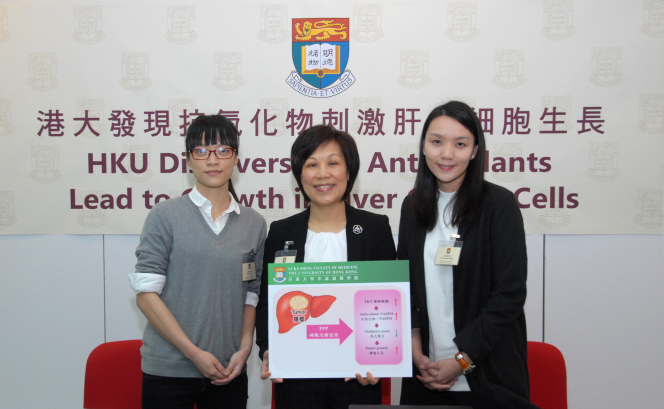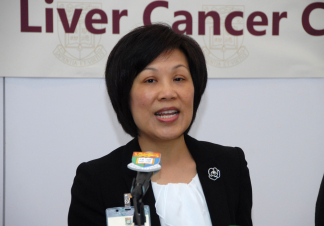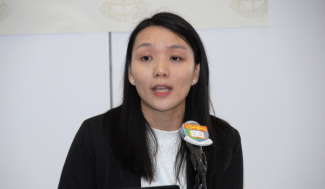Media
HKU Discovers that Antioxidants Lead to Growth in Liver Cancer Cells
18 Feb 2016

Ms Iris Xu (Left), PhD candidate of Department of Pathology, Professor Irene Ng (Middle), Loke Yew Professor in Pathology, Chair Professor and Head of Department of Pathology, Director of State Key Laboratory for Liver Research, and Dr Carmen Wong (Right), Assistant Professor of Department of Pathology, Li Ka Shing Faculty of Medicine, HKU, took a group photo at the press conference.
The research team at Li Ka Shing Faculty of Medicine, The University of Hong Kong (HKU) discovers that antioxidants facilitate the growth in liver cancer cells. Liver cancer patients are hence not recommended to take high dose of antioxidant supplements. The findings are applicable to other cancers having the same metabolic pathway, such as colorectal cancer and lung cancer. The above novel findings of the role of antioxidants in cancer development may shed light to new therapeutic approaches that involve blockade of antioxidant-producing systems in cancer cells. The groundbreaking findings have been published in Proceedings of National Academy of Sciences of the United States of America (PNAS), the top international journal which publishes articles with original scientific research of exceptional importance.
Liver cancer in Hong Kong
Primary liver cancer (hepatocellular carcinoma, HCC) is the fifth-ranking cancer in the world, with an annual incidence of over 500,000 new patients. More than half (55%) of the new cases occur in Hong Kong and China. The incidence of primary liver cancer is particularly high in Hong Kong with more than 1,400 new cases per year. It is because of the high prevalence (8-10%) of hepatitis B virus (HBV) infection in the population while 80% of liver cancer patients are HBV carriers. Liver cancer is the third most common cancer causing death in Hong Kong. It has a high recurrence rate and is refractory to chemotherapy, and these lead to ultimate death in most patients.
Research method and findings
Using liver cancer in preclinical animal as model, the study shows that excessive reactive oxygen species (ROS) or free radicals cause more oxidative stress, while excessive accumulation of oxidative stress is harmful to cancer cells and lowers the growth rate. The research team further discovers that the pentose phosphate pathway (PPP) produces more antioxidants in cancer cells (antioxidant effect). Oxidative stress decreases as more antioxidants are produced, and this leads to growth in cancer cells. More importantly, the research team finds that therapeutically targeting the key enzyme, transketolase, in the PPP would create metabolic vulnerabilities in cancer cells, enhancing the sensitivity of cancer cells to existing drug treatment.
Significance of the study
The research findings have significant clinical impacts. First, identification and characterisation of the metabolic machinery in liver cancer is fundamental to the understanding of the pathogenesis of the disease and the design of novel therapeutic interventions for liver cancer patients. The study has suggested that the PPP are attractive therapeutic targets. Drugs against the PPP represent a novel therapeutic strategy and merit more extensive investigations. Second, the study raises public awareness that supplementation of antioxidants may not necessarily be beneficial to cancer patients. Third, the findings are applicable to other cancers having the same metabolic pathway, including colorectal cancer, rectal cancer, bladder cancer, gastric cancer, ovarian cancer, lung cancer, renal cell cancer and prostate cancer.
Professor Irene Ng Oi-lin, Loke Yew Professor in Pathology, Chair Professor and Head of Department of Pathology, and Director of State Key Laboratory for Liver Research, Li Ka Shing Faculty of Medicine, HKU, who led the study says, “In long term, our study can facilitate the development of safer, effective and targeted treatment that can be used in combination with chemotherapy to completely eradicate this deadly disease and benefit liver cancer patients. Liver cancer patients are advised to have a balanced diet and they should note that a high intake of antioxidant supplements may not be beneficial to health.”
About the research team
The research is jointly conducted by Professor Irene Ng Oi-lin, Loke Yew Professor in Pathology, Chair Professor and Head of Department of Pathology, and Director of State Key Laboratory for Liver Research, Dr Carmen Wong Chak-lui, Assistant Professor of Department of Pathology, and Ms Iris Xu Ming-jing, PhD candidate of Department of Pathology, Li Ka Shing Faculty of Medicine, HKU.
Please visit the website at http://www.med.hku.hk/v1/news-and-events/press-releases for press photos and powerpoint presentation.
Professor Irene Ng, Loke Yew Professor in Pathology, Chair Professor and Head of Department of Pathology, Director of State Key Laboratory for Liver Research, Li Ka Shing Faculty of Medicine, HKU, points out that liver cancer patients are advised to have a balanced diet and a high intake of antioxidant supplements may not be beneficial to health.


